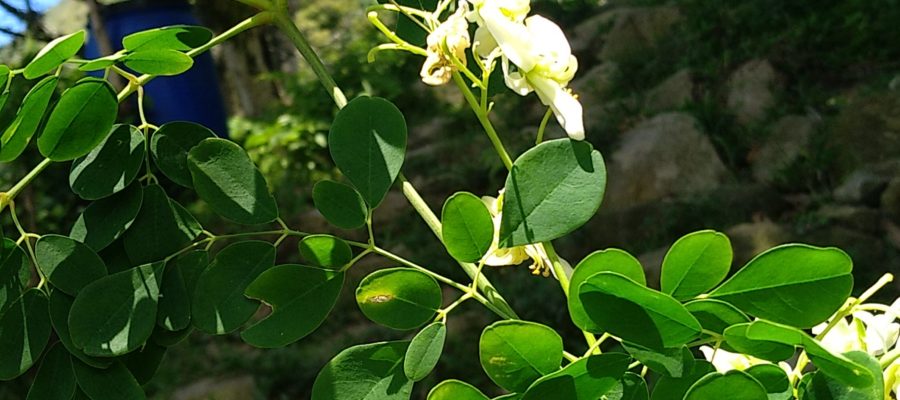
Scientific Name: Moringa oleifera
Bahasa Indonesian: Kelor
Batak: Kelor
Basic Information:
Moringa oleifera is a fast-growing, drought-resistant tree of the family Moringaceae, native to the Indian subcontinent.[2] Common names include moringa,[3] drumstick tree[3] (from the long, slender, triangular seed-pods), horseradish tree[3] (from the taste of the roots, which resembles horseradish), and ben oil tree or benzolive tree[3] (from the oil which is derived from the seeds).
It is widely cultivated for its young seed pods and leaves used as vegetables and for traditional herbal medicine. It is also used for water purification.[4][5] Although listed as an invasive species in several countries, M. oleifera has “not been observed invading intact habitats or displacing native flora”, and so “should be regarded at present as a widely cultivated species with low invasive potential.” [2]
Health Benefits
Moringa, a nutrient-packed superfood that comes from the Moringa oleifera tree in India, has been used for centuries in Eastern cultures to alleviate headaches, ease constipation, stimulate the immune system, promote weight loss, and increase libido. Modern research suggests moringa can help lower cholesterol, balance blood sugar, and ease other health concerns.
Moringa powder is often added to smoothies, nutrition bars, and energy drinks or drank as a tea. Moringa oil is used topically for hair and skincare.
Health Benefits
Frequently referred to as a “miracle tree,” moringa has a long history of use in systems of traditional medicine throughout South Asia that is being explored in modern science.
The leaves, pods, and seeds of the moringa tree are rich in antioxidants, amino acids, vitamins, and minerals. A complete protein, moringa leaf powder contains all nine essential amino acids the body needs. The pods are a rich source of vitamin C, and the edible seeds contain a high amount of oleic acid—a beneficial fatty acid also found in olive oil.2
Studies show moringa contains a number of compounds with health-promoting effects, including quercetin and beta-sitosterol.3 It also has anti-inflammatory compounds and may protect against health issues linked to oxidative stress and chronic inflammation, including heart disease and certain cancers.4
In addition, it may help treat and/or prevent several chronic conditions, such as diabetes, high cholesterol, arthritis, asthma, and high blood pressure.
While findings from animal-based research, laboratory experiments, and small clinical studies suggest moringa has promise in the treatment of several health conditions, more research is needed to confirm this.
Here’s a look at some of the preliminary evidence regarding moringa.
Diabetes
Research suggests moringa may help fight diabetes by balancing blood sugar and reducing related complications, although precisely how it works isn’t completely understood.
One theory is it boosts insulin production, as a small clinical trial published in 2016 suggests. In the study of healthy volunteers, a single 4-gram dose of moringa leaf powder was shown to increase circulating insulin and lower blood sugar.
Another small clinical trial, this one published in the journal Nutrients in 2018, found moringa may reduce post-meal blood sugar spikes in people with diabetes. The study included 17 people with diabetes and 10 healthy subjects. It found that moringa blunted post-meal glucose spikes by up to 40 mg/dL and shortened the time to peak blood sugar by about 20 minutes. Moringa did not have a significant impact on blood sugar in those without diabetes, however.
Additionally, a 2019 study in rats found moringa may help diabetes by reducing insulin resistance, a condition where cells in the body are less able to absorb blood glucose. Rats in the study were fed a high-fructose diet to induced insulin resistance. After four weeks of treatment with moringa, insulin sensitivity improved, helping to reduce blood sugar.
The benefits are not believed to be limited to the moringa leaf. A 2012 study published in the Journal of Diabetes found moringa pod extract may help fight diabetes as well. Researchers fed moringa pod extract to diabetic rats and found it significantly reduced the progression of diabetes and related complications.
Cardiovascular Disease
Extracts of the moringa leaf may help lower cholesterol and improve heart health.
A review published in Frontiers in Pharmacology in 2012 examined the existing clinical and animal trials of moringa leaf and concluded it may be an effective treatment for dyslipidemia, a condition marked by elevated levels of cholesterol, triglycerides (a type of blood fat), or both.5
Moringa seeds have traditionally been used to lower blood pressure and improve heart function, a use current research suggests may be effective. A 2017 study in rats found moringa seeds offer cardio-protective benefits and may help treat high blood pressure.10 Another rat study published in 2019 found moringa seeds may prevent age-related heart and vascular disorders.11
While still limited to animal studies, the research suggests the vascular protective effects of moringa may include reducing inflammation associated with oxidative stress and relaxing arteries to improve blood flow.
Weight Loss
Moringa is often touted as a weight loss aid, but there is limited research to support this.
Some research suggests it may help to treat metabolic syndrome, a cluster of symptoms that include abdominal obesity.12 It is also being investigated as a weight loss aid in combination with other herbs.
In a clinical trial of 140 overweight adults, a proprietary blend of Curcuma longa, Moringa oleifera, and Murraya koeingii combined with modest calorie restriction and physical activity was found to lower body-mass index (BMI) by 2 points over the 16-week study.
Sexual Function
As far as its potential as an aphrodisiac, moringa is used to treat erectile dysfunction in traditional medicine.
While this use has not been proven in human trials, studies in rats suggest moringa may improve sexual function in males by increasing testosterone levels.
How to plant Moringa?
There are different ways to plant Moringa. You just can take a small part of a branch and plant it to the earth. Also you can take some roots and out of this a new tree will come or you take the seeds and grow with them.
The Moringa Tree don´t need a lot. Only he don´t want to stay in the wet. He don´t needs a lot of nutrition and especially he can go around with only a little bit of water. Two month of no rain is no problem for the tree.
We made seedlings from small branches in Polybags, but also we use the seeds to make seedlings. Even in two weeks already they grow up to 5 cm and we have to give them a bigger polybag.
If you want to harvest the leaves, then you let the tree just growing only around 1,7 m high and you cut him. All the time for harvesting you cut him down to this high. then you get more then a bush and you can harvest a lot of leaves.

